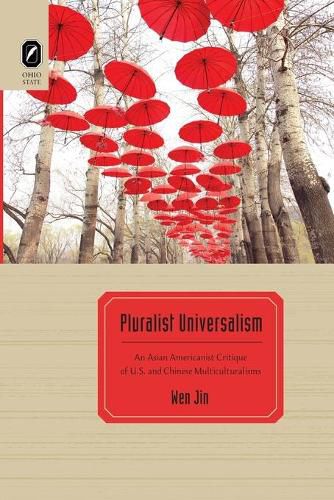Readings Newsletter
Become a Readings Member to make your shopping experience even easier.
Sign in or sign up for free!
You’re not far away from qualifying for FREE standard shipping within Australia
You’ve qualified for FREE standard shipping within Australia
The cart is loading…






This title is printed to order. This book may have been self-published. If so, we cannot guarantee the quality of the content. In the main most books will have gone through the editing process however some may not. We therefore suggest that you be aware of this before ordering this book. If in doubt check either the author or publisher’s details as we are unable to accept any returns unless they are faulty. Please contact us if you have any questions.
Pluralist Universalism: An Asian Americanist Critique of U.S. and Chinese Multiculturalisms by Wen Jin is an extended comparison of U.S. and Chinese multiculturalisms during the post-Cold War era. Her book situates itself at the intersection of Asian American literary critique and the growing field of comparative multiculturalism. Through readings of fictional narratives that address the issue of racial and ethnic difference in both national contexts simultaneously, the author models a double critique framework for U.S.-Chinese comparative literary studies.
The book approaches U.S. liberal multiculturalism and China’s ethnic policy as two competing multiculturalisms, one grounded primarily in a history of racial desegregation and the other in the legacies of a socialist revolution. Since the end of the Cold War, the two multiculturalisms have increasingly been brought into contact through translation and other forms of mediation. Pluralist Universalism demonstrates that a number of fictional narratives, including those commonly classified as Chinese, American, and Chinese American, have illuminated incongruities and connections between the ethno-racial politics of the two nations. The double critique framework builds upon critical perspectives developed in Asian American studies and adjacent fields. The book brings to life an innovative vision of Asian American literary critique, even as it offers a unique intervention in ideas of ethnicity and race prevailing in both China and the United States in the post-Cold War era.
$9.00 standard shipping within Australia
FREE standard shipping within Australia for orders over $100.00
Express & International shipping calculated at checkout
This title is printed to order. This book may have been self-published. If so, we cannot guarantee the quality of the content. In the main most books will have gone through the editing process however some may not. We therefore suggest that you be aware of this before ordering this book. If in doubt check either the author or publisher’s details as we are unable to accept any returns unless they are faulty. Please contact us if you have any questions.
Pluralist Universalism: An Asian Americanist Critique of U.S. and Chinese Multiculturalisms by Wen Jin is an extended comparison of U.S. and Chinese multiculturalisms during the post-Cold War era. Her book situates itself at the intersection of Asian American literary critique and the growing field of comparative multiculturalism. Through readings of fictional narratives that address the issue of racial and ethnic difference in both national contexts simultaneously, the author models a double critique framework for U.S.-Chinese comparative literary studies.
The book approaches U.S. liberal multiculturalism and China’s ethnic policy as two competing multiculturalisms, one grounded primarily in a history of racial desegregation and the other in the legacies of a socialist revolution. Since the end of the Cold War, the two multiculturalisms have increasingly been brought into contact through translation and other forms of mediation. Pluralist Universalism demonstrates that a number of fictional narratives, including those commonly classified as Chinese, American, and Chinese American, have illuminated incongruities and connections between the ethno-racial politics of the two nations. The double critique framework builds upon critical perspectives developed in Asian American studies and adjacent fields. The book brings to life an innovative vision of Asian American literary critique, even as it offers a unique intervention in ideas of ethnicity and race prevailing in both China and the United States in the post-Cold War era.